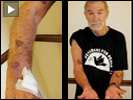JUAN GONZALEZ: On Tuesday, Hillary Clinton gave a major address calling for Internet freedom around the world. Speaking at George-–Washington University, Clinton condemned the Egyptian and Iranian governments for arresting and beating protesters.
HILARY CLINTON: What happened in Egypt and what happened in Iran, which this week is once again using violence against protesters seeking basic freedoms, was about a great deal more than the Internet. In each case, people protested because of the frustration with the political and economic conditions of their lives. They stood and marched and chanted and the authorities tracked and blocked and arrested them.
AMY GOODMAN: Just moments before Hillary Clinton spoke those words, a 71-year-old man was violently ejected from Clinton’s own event and arrested for turning his back on the Secretary of State. TV cameras caught part of what happened.
HILARY CLINTON: Than the government pulled the plug. So phone service was cut off. A TV satellite signals were jammed. Internet access was blocked for nearly the entire—
RAY McGOVERN: [Screaming]This is America! This is America! Who are you? Who are you?
JUAN GONZALEZ: The voice you heard screaming was that of Ray McGovern as he was dragged away by security guard that left him bruised and bloodied. He was then arrested. McGovern is a former Army intelligence officer and a 27-year veteran of the CIA. He was one of the daily briefers for President George H.W. Bush. He has since become a vocal critic of US foreign policy. He joins us in Washington, D.C. Ray, you were seriously hurt. Tell us what happened.
RAY McGOVERN: I was pounced upon. I was blindsided, really. I was looking straight to the back, minding my own business. The only offense was standing up when everyone else was sitting down. Without any warning, I was pounced upon by and, what I call large manhandled by a fellow that looked like an NFL football player in plain dress. I don’t know who he was, that is why you hear me screaming, "Who are you? Who are you?" And I never did get the answer to that. So it was quite abrupt, quite violent. And the supreme irony, of course, sounds like something right out of Franz Kafka, four paragraphs later, Hillary Clinton is saying what you just quoted her as saying. You know, one has to keep one’s sense of humor in all of this, especially when one bears these kinds of bruises. I cannot show you the ones down below. I was listening on the way in, I tuned in a little late to your show. And when I heard Clinton say, that little clip, "We strongly oppose the use of violence," this is yesterday. We have deep concern over the actions of security forces. And I’m saying, yes! She is going to apologize. Like my Veterans for Peace colleagues asked her to do. Then I realized, she is talking about Bahrain. Straight out of Kafka.
AMY GOODMAN: So, you were seriously hurt. What parts of your body? What did they do to you?
RAY McGOVERN: Well, they put two sets of handcuffs on me roughly. They were the iron or steel handcuffs. They dug into my wrists. You can see some of the stuff right here. They put them behind my back of course and I started—bleeding profusely over my pants. We have the pants, they are full of blood. When somebody said, "Is that his blood?" One of the cops said, "No, no I pricked my finger". Right. The whole back seat of the pants is surfused with blood. They throw me-–well they didn’t throw me, they placed me in a patrol car—I try not to exagerate here—and I was taken up to one of the police headquarters in D.C. Mugshotted, fingerprinted to a fair thee well, and put in a cell of the size of Bradley Manning now occupies in Quantico.
AMY GOODMAN: Ray we only have a minute but why were you there? Why did-–were you standing up?
RAY McGOVERN: I was standing up in silent witness to the fact that Hillary Clinton is responsible or partly responsible for the countless thousands of Iraqis, Americans, Afghans, and God help was, Iranians—I hope not—and that she should not get the idea that everyone is going to sit down and applauded politely when there are so many of us that are usually excluded from these sessions who are feeling very, very sad and very angry at the foreign policy of our government. Very seldom do have a chance to express that. I thought that I expressed that in a most nonviolent way by simply quietly with my back to her with a T-shirt that said "Veterans for Peace."
AMY GOODMAN: Well Ray McGovern, we want to thank you for being with us, former top briefer of Vice President George H.W. Bush. Ray worked for the CIA for more than a quarter of a century.


